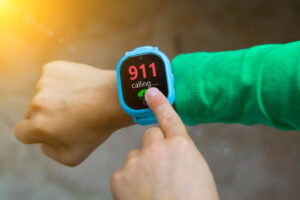Personal Safety for Women: Self-defense Goes Way Beyond the Physical
Stacey J. Drubner, JD, LICSW, MPH

EAP Ask the Expert: Jennifer Goba, Senior Manager of Investigations and Workplace Violence – Police, Security & Outside Services – Massachusetts General Hospital
Summer is often a time when there are more personal safety risk for women, due to:
- Longer daylight hours
- More activities outside
- Increased opportunity for contact
- Adverse reactions to the heat
However, we should be vigilant all year long.
Being the victim of a violent crime is rare, but it can happen, no matter where you live. In 2016, Vanessa Marcotte was killed while out for a walk on a weekend day in rural Princeton, MA. Women are more likely to be sexually assaulted and are often viewed as easier targets in general. It follows that women may have concerns about their personal safety.
- From Yahoo News – The UK Office for National Statistics (ONS) reported that almost 50% of women felt unsafe walking alone after dark in a busy public place or on a quiet street near their home, and 81% felt unsafe walking alone after dark in a park or other open space
- Women’s Running cited a 2019 Survey: 68% of U.S. women have experienced sexual harassment or assault in public spaces such as streets, trails, and parks
- RunGrl reported that 82% of women runners sometimes worry about being assaulted or attacked and 41% always worry about it
It might seem scary or unpleasant to think about the possibility of being a victim of any crime, let alone a violent one. However, by planning and making the practice of personal protection second nature, you are more likely to enjoy activities with less fear and a greater level of safety.
Spotlight: Jenn Goba
MGH Police and Security
The EAP partnered with Jenn Goba, from MGH Police and Security, for guidance on staying safe without sacrificing freedom or fulfillment. Jenn discusses how to avoid being a victim in the first place and how to respond if you find yourself facing a threat. Although this feature focuses on women, most of the advice and tips would be applicable for men’s safety as well.

Your #1 Tool for Safety: Be Prepared
The key to safety and survival lies in how you prepare, think, and react. Even having a black belt in martial arts will not help you if you don’t anticipate risk and are not psychologically ready to respond. This requires taking a step back and making a genuine effort to consider your options for lowering your risk of being a victim.
Jenn explains that many of us don’t prepare for and practice safety, although it takes just a few extra minutes. The result is that we may find ourselves wasting precious time deciding what to do in the moment. It is common to freeze (mentally, physically, and emotionally) when confronted with an unexpected threat. The chance of this increases if you don’t have a general plan for what to do in advance. Jenn indicates that knowledge and a sense of control will help to prevent paralysis, and prompt action in the face of danger. It’s helpful to understand your own typical response (flight, freeze, fight) to stress so that you can learn more adaptive strategies if necessary.
Increase your Awareness
People who are aware are less likely to be a victim because they remove the opportunity for surprise. Simply put, potential criminals prey on people who are not paying attention. Jenn discusses finding an appropriate level of “fear”. The goal is to be ready and vigilant but not hyper-vigilant. Being overly aware may result in missing the big picture and sacrificing enjoyment of your activities.
What is going on around you?
- How well do you know your route?
- Have a back-up plan: what are some alternatives or options for help? For example, there is a gas station around the corner or a main road to the right
- It’s fun to be adventurous but being somewhere without an exit plan increases risk
- Jenn suggests avoiding new routes or unknown trails by yourself or late in the day
- Be familiar with using GPS and other navigation options on your phone
- Know who is or might be in your physical space; who might be a threat or a source of assistance?
Avoid distractions or barriers to awareness
Phones
It is usually a good idea to have your phone with you when doing an activity outside alone. However, consider not using your phone or device in a way which distracts you from paying attention to your surroundings. We know from data on texting and driving, that those using devices make mistakes and have accidents. Observe your level of attentiveness when you are trying to have a conversation while searching the internet. Using your phone while walking or running may also lead to distraction and a failure to notice potential threats around you.
One exception is when you are using your phone for safety.
- Jenn indicates that speaking with someone on your phone for protection can replicate being with a buddy in person. This is especially true if you are able to be vigilant and monitor your environment at the same time
- Phones also offer emergency mechanisms (discussed in more detail below in the section on Devices)
Headphones
We all understand the benefit of and desire to use music while exercising, or talking through earbuds. The downside is that you may miss some potential threats. Jenn recommends that if you must use headphones, consider using a single headphone or some that are not noise cancelling. Some running bloggers also suggest using just one headphone or a lower volume.
Inform and include others of your plans
Of course, doing an activity with a buddy is ideal from a safety perspective, but this is not always feasible or desirable. If you prefer to or have no other choice but to be alone, consider these safety practices:
- Let someone know that you are going out alone for a social event, a walk, run or hike
- Consider sharing your expected route and even your exact location via your phone
- Commit to notifying a buddy that you arrived (at home or work) safely
What if you are or think you might be in a Threatening Situation?
If you practice your safety plan often enough, you will be in the best position to react when you sense you might be in danger. As with many of the wellness exercises (mindfulness, building resilience) we have discussed in other “Ask the Expert” features, the most successful, important components are figuring out what works for you and using repetition to create a “muscle memory” affect.
Jenn offers the following general guidance:
- Trust your instincts
- Don’t be afraid to ask for help (a walk to your car at night, for example)
- Show confidence and acknowledge the presence of others
– Those with negative intentions may not want to deal with someone exhibiting strength or awareness - Take action (set a boundary, create distance, run) Don’t be concerned about offending someone if you mistakenly perceive a threat; any hesitation may lead to a bad outcome
- Escaping should be your main priority
- If you can’t escape, then FIGHT!
- Yell, make a lot of noise and draw attention to yourself and the situation
- Be ready with a mantra (a statement that is practiced and automatic, such as “I can handle this.”) This will help you to be motivated to fight and keep your focus
- Jenn explains that there is a common belief that women cannot overpower men. This may be largely true but those who do fight back can benefit from the tool of surprise. This is because it’s not necessarily expected
- Runners World highlighted the story (apologies for language) of a woman who saved herself by being prepared and willing to take action when she was attacked
- Use anything you can find – sticks, rocks, keys
- Strike for targets that are vulnerable parts of the body: knees, groin, eyes, throat
Is Self-defense Training a Good Idea?
Jenn encourages women to engage in anything that empowers them and improves self-confidence. Some women shy away from these classes because they worry about their skill level or being embarrassed. Jenn offers that even if you pick up and implement just a few ideas, you will be better prepared to protect yourself.
The most helpful self-defense classes should focus on both physical, and non-physical tools (avoiding risk in the first place, how to carry yourself, looking out for threats, having a general escape plan).
Here are some places that might offer training in your community:
- Local police departments
- Rape crisis centers
- Colleges and universities
- Gyms
- Workplaces
MGB Offers AVADE (Awareness-Vigilance-Avoidance-Defense-Escape) workplace violence training.
- AVADE (HealthStream course code – MGBE AVADE® Workplace Violence Prevention) provides a comprehensive, current, and effective approach to preventing, avoiding, de-escalating, and mitigating violence and aggression
- It can help you become safety-aware with a vigilant mindset, understand body language communication and de-escalation, and teach you defense techniques for yourself and others
- Although this is a workplace training, many of the concepts are transferable to any environment
Here are some other self-defense training resources*:
- Wiki How – Choosing a Self-defense Class
- SEPS – Women’s Self-defense Boston- Free Classes (Might be on-line due to the Pandemic)
- Very Well Fit – Online Self-defense Classes
 Self-protection Devices
Self-protection Devices
When it comes to self-defense devices and tools, Jenn advocates for anything you are comfortable carrying and willing to use. Give some thought to what is actually going to make you safer. If you are not properly trained/familiar with the device or not prepared to use it, the “weapon” becomes a liability, rather than a safety mechanism. Below we use the example of pepper spray:
- It is legal to carry pepper spray in MA, but not legal to have it shipped to MA
- There are different kinds of pepper spray, so it is useful to understand which is best for you
- Pepper spray will provide no help to you if it is in the bottom of your purse
- You should learn how to use it in advance, so you are not figuring this out when you really need it
- If you think you are in danger, don’t hesitate to use it. Taking too much time to decide, puts you at risk. You lose precious reaction time; someone could take it away or use it against you
Other safety devices*
- Invisawear – Jewelry that Sends an SOS
- Run Angel – Locator and Alarm
- SaferRun – Ripcord Siren Personal Alarm
- Smart phone safety offerings
– Apple
– Android - Keys – can be used as a weapon in certain situations
* Neither MGH Police and Security or the EAP specifically endorses any of these resources
Social and Dating Safety
- Use a buddy system when you go out
– Follow the suggestions above for notifying friends and family about your whereabouts and checking in - Consider limiting alcohol consumption if you plan to walk home by yourself or are with an unfamiliar person
- Intoxication can make you more susceptible to harm
- Watch your drink in bars and at parties and stick with your group, as there is always a risk of someone putting another drug in your drink
- Boston and Cape Cod Police have already sent out warnings about instances of drugging drinks in the past few weeks
Dating apps & online dating
- Don’t share identifying information or contact details too soon
- Meet new people in a public place
- Don’t provide any security information (passwords, bank accounts etc.)
- If someone or something seems to be too good to be true online, it is probably the case
- It’s not normal for a new person in your life to ask to borrow money
- Be suspicious if someone in a long distance or online relationship asks you to send money, gift cards or items for them to resell
- Here are more tips from RAINN (Rape, Abuse & Incest National Network)
Ride share safety
- Always check to make sure you are getting in the right car
- Require the driver to identify his rider
- Let others know you are taking Uber or Lyft and share your location
- Speak up if you have safety concerns
- Review and use Uber and Lyft safety features and know how and where to access them in the apps. They offer “in-ride” safety options
About the MGH Police, Security & Outside Services
MGH Police and Security strives to proactively and competently deliver protective and supportive services to the Mass General community, facilitating a welcoming, accessible and safe environment.
Help from the EAP
The Mass General Brigham EAP offers free and confidential services for employees and immediate household family members. EAP records are separate from medical and HR records. Contact the EAP at 866-724-4327, or request an appointment via our online form for confidential assistance.







